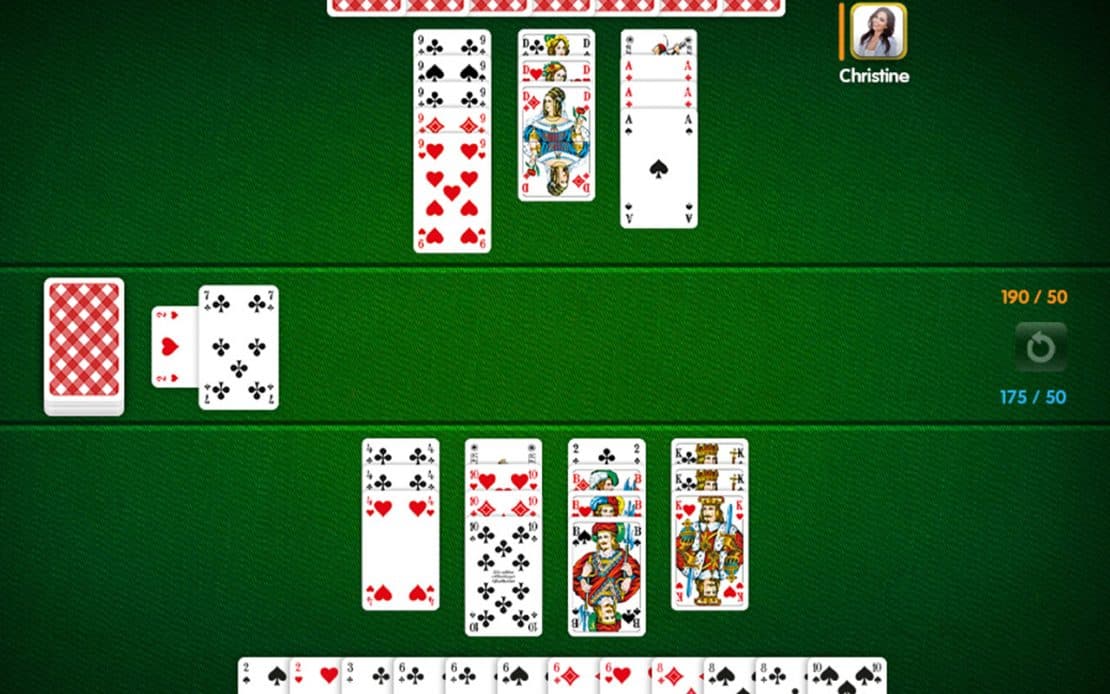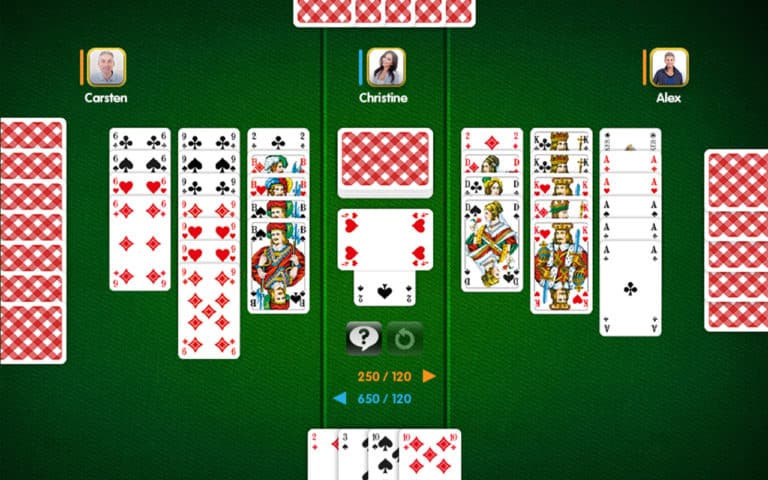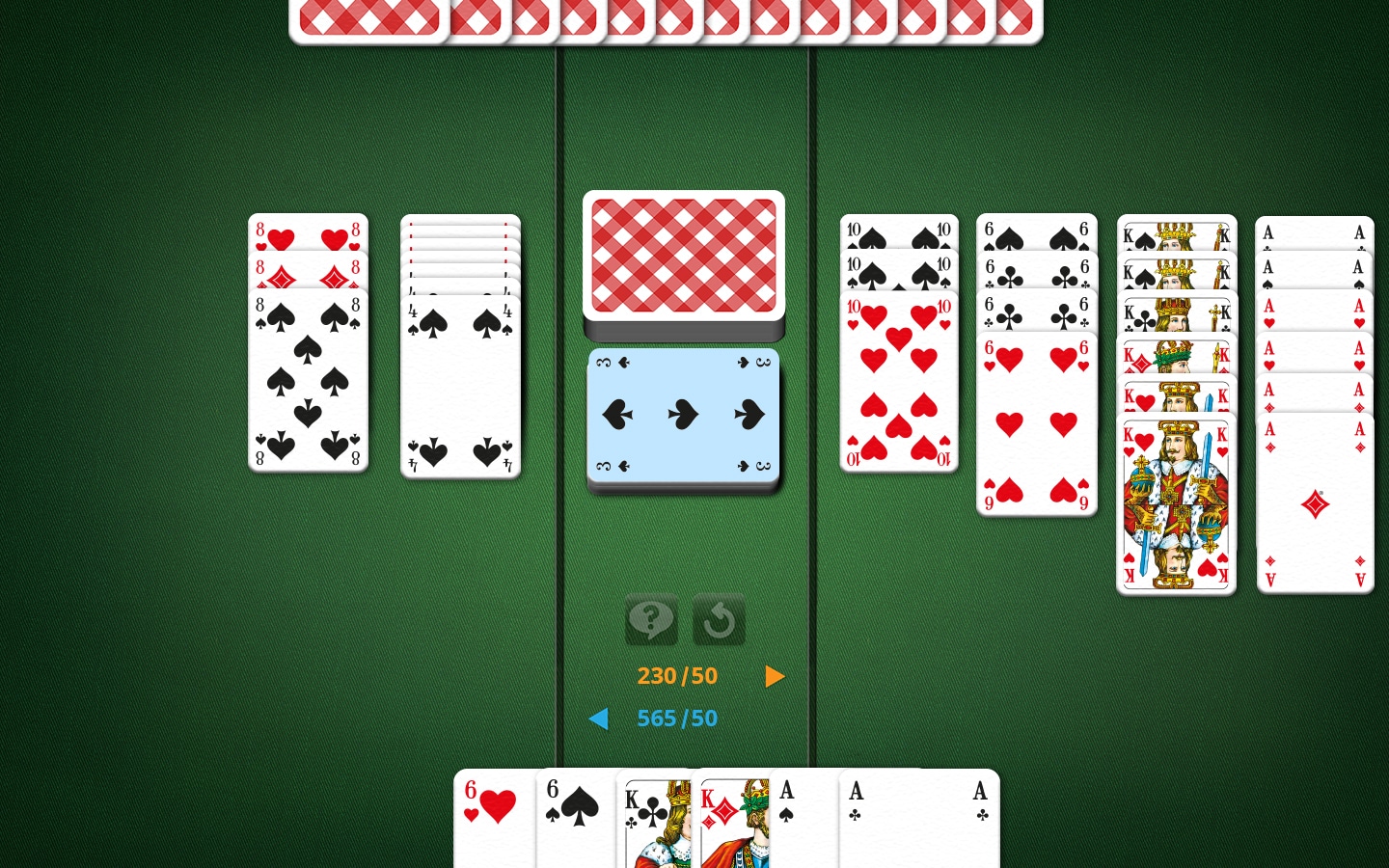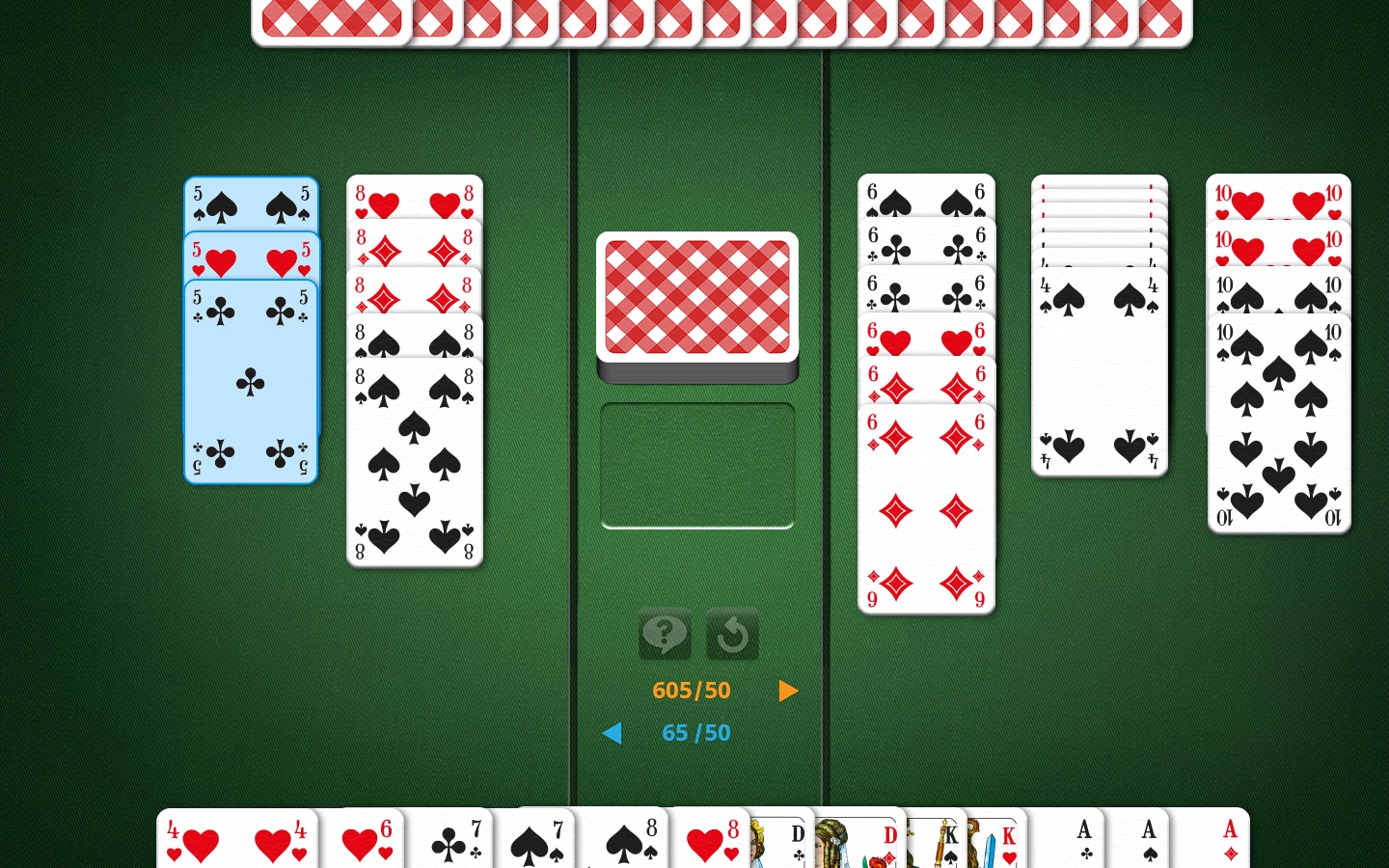Introduction
How To Play Canasta With 4 Players: The exciting world of Canasta! If you have four eager players and are ready for some friendly competition, this classic card game is just the thing for you. Canasta is a captivating and strategic game that combines elements of skill, luck, and teamwork, making it a favorite pastime for many. To start, divide yourselves into two teams of two players each, sitting across from each other at a table. You’ll need two standard decks of cards, including four jokers, giving you a total of 108 cards to play with.
The objective of Canasta is to score points by forming melds of cards game of the same rank and “going out” by getting rid of all your cards. But beware, it’s not as simple as it sounds! You’ll need to strategize, create melds, and thwart your opponents’ plans with tactical play.Throughout the game, communication with your partner is vital, as you work together to build the most valuable melds and strategize against the other team. The game unfolds in rounds, and each player takes turns drawing and discarding cards to build their melds.
Keep an eye out for wild cards and bonuses, which can significantly boost your score. As the game progresses, tension rises, and the competition heats up, making every moment thrilling.Now that you have the basics, gather your friends, shuffle those cards, and let the Canasta fun begin! Remember, it’s not just about the luck of the draw; it’s about forming a winning strategy with your partner. Enjoy the challenges, laughter, and triumphs as you immerse yourself in the captivating world of Canasta with four players!

How do you play canasta with 4 players?
If playing with four players, two teams must be chosen, with each consisting of two players. Teammates will sit across from one another. If the game is being played with two or three players, no teams are formed, and each player is on his or her own. The deck is shuffled by one player.
To play Canasta with four players, you’ll need two standard decks of cards, including four jokers, totaling 108 cards. The players form two teams of two, with partners sitting across from each other. The objective is to score points by creating melds of cards of the same rank and “going out” by getting rid of all your cards.
To start, shuffle the cards thoroughly and deal 11 cards to each player. Place the remaining cards in the center to form the draw pile, and flip the top card face-up to start the discard pile.
On a player’s turn, they can either draw two cards from the draw pile or pick up the entire discard pile, provided they can use the top card in a meld immediately. After drawing, players can lay down melds, consisting of at least three cards of the same rank.
Jokers and deuces are wild cards, and they can be used in melds to enhance their value. There are also special bonuses for forming certain types of melds.
The game continues with players drawing, melding, and discarding until someone goes out. Once a player goes out, the round ends, and the scores are calculated. The game typically lasts several rounds, with the team accumulating the most points being declared the winner. Communication and strategy between partners are crucial to mastering this engaging card game.
How many decks of cards do you need for canasta with 4 players?
Welcome to Canasta! Canasta is a game played with 4 people (2 teams) and uses 2 decks of cards including jokers (108 cards).
For Canasta with four players, you will need two standard decks of playing cards. Each deck should contain 52 cards, including four suits (hearts, diamonds, clubs, and spades) with 13 cards in each suit. Additionally, you will need four joker cards, two from each deck, bringing the total number of cards to 108.
The reason for using two decks is to ensure that there are enough cards in play for strategic gameplay and to accommodate the larger number of players. Canasta involves creating melds of at least three cards of the same rank, and having two decks allows for more opportunities to form melds and execute tactical moves.
Using two decks also introduces a level of unpredictability and excitement to the game, as players must keep track of multiple cards in play and plan their strategies accordingly. With the proper setup and two decks of cards, you and your fellow players can enjoy the thrilling and competitive experience of Canasta with four players.
How many people does it take to play canasta?
Canasta (/kəˈnæstə/; Spanish for “basket”) is a card game of the rummy family of games believed to be a variant of 500 Rum. Although many variations exist for two, three, five or six players, it is most commonly played by four in two partnerships with two standard decks of cards.
Canasta is a card game that requires at least two players to play, but it can accommodate more participants. The ideal number of players is typically four, as the game is usually played in partnerships of two. Having four players allows for strategic cooperation and competition between teams, adding an extra layer of excitement and camaraderie to the game.
However, Canasta can also be played with three players, where one player partners with two others. In this variation, each player’s strategy must adapt to the unique dynamic of the trio, making it a different but still enjoyable experience.
While Canasta can be played with just two or three players, it truly shines with a full group of four. The game’s rules and melding mechanics are designed to accommodate this number, striking the right balance between individual skill and teamwork. Whether you have a small gathering or a larger group, Canasta is a versatile and engaging card game that promises hours of fun and friendly competition for players of all ages.
How many cards do you need for a 4 player canasta?
How many cards are dealt in Canasta varies depending on the number of players: In a game of two, each player receives 15 cards; in a game of four, 11 cards. The leftover cards become the stock.
For a 4-player Canasta game, you will need a total of 108 cards. To achieve this, you should use two standard decks of playing cards, each containing 52 cards (comprising four suits: hearts, diamonds, clubs, and spades, with 13 cards in each suit). Additionally, you will require four joker cards, two from each deck.
With two decks of cards and the inclusion of the jokers, you have the perfect setup for a 4-player Canasta game. This card count ensures that there are enough cards in play for all participants to form melds, strategize, and compete in partnerships effectively.
Having four players enables the game to unfold in a balanced and engaging manner. It allows for the formation of teams of two players each, promoting communication, cooperation, and rivalry as players work together to create melds and thwart their opponents’ plans.
So, gather your friends or family, shuffle those 108 cards, and get ready for a thrilling and enjoyable Canasta game with four players.

Is canasta easy to play?
Canasta combines elements of Bridge and Rummy. This game is easy to learn, especially for players of these games.
Whether Canasta is easy to play depends on the individual and their familiarity with card games. For those already acquainted with traditional card games like Rummy, Canasta might come naturally. Its straightforward objective of forming melds and “going out” by emptying one’s hand can be grasped quickly.
However, for newcomers, Canasta may initially seem a bit complex due to its unique rules involving wild cards, bonuses, and the partnership aspect. Learning the various types of melds and understanding the point system might take some practice.
Nonetheless, with a bit of patience and some hands-on experience, Canasta becomes more accessible and enjoyable. The game’s blend of strategy and luck keeps players engaged and eager to improve their skills.
To ease into Canasta, starting with the basic rules and gradually incorporating advanced concepts is recommended. Whether played casually with friends or more competitively, Canasta offers a rewarding and sociable card game experience for players willing to invest a little time in learning its intricacies.
How do you remember cards in canasta?
Things that helped me:
- Do not turn the trick fast. Look at the cards that were played, make a mental note.
- Start with counting just the honors and trumps, when this becomes automatic try to remember every card.
- When dummy – don’t sit idle, count out your partners hand. Look at it later to see how well you counted.
Remembering cards in Canasta can significantly enhance your gameplay and strategic decision-making. Here are some tips to help you improve your card memory:
Organize Your Hand: Sort your cards by rank or color. This arrangement allows you to quickly identify potential melds and keeps you aware of which cards you need to complete them.
Observe Discards: Pay close attention to the cards discarded by your opponents and partner. This can give you valuable information about the cards they may be holding and help you adjust your strategy accordingly.
Track Wild Cards: Keep track of the jokers and deuces that have been played. Knowing which wild cards are still in play can influence your melding choices and reduce the risk of your opponents forming “Canastas” (melds of seven cards of the same rank).
Communicate with Your Partner: Share information about the cards you have and the melds you are working on with your partner. This collaborative approach will help both of you make informed decisions throughout the game.
Stay Focused: Concentration is key. Avoid distractions and stay focused on the game to ensure you don’t miss any critical information about the cards in play.
How do I form partnerships in a 4-player Canasta game?
Forming partnerships in a 4-player Canasta game is a crucial step that sets the foundation for cooperative play. To establish the partnerships:
Seat Arrangement: Sit around a table with the four players, and determine who will be partners based on their seating positions. Players sitting opposite each other will be teammates. For clarity, you can refer to each player as North, South, East, and West.
Choosing Partners: If the game is part of a series, partners are usually predetermined, and players stick with the same teammate throughout. However, in casual games, you can randomly draw cards, and players with matching cards become partners.
Dealing Cards: Shuffle the deck thoroughly and deal the cards clockwise, one at a time, to each player until the entire deck is distributed. The player who receives the first red three starts the game.
Communication: Partners must communicate openly but discreetly during the game. They can indicate the types of melds they have, strategize on which cards to discard, and warn each other of potential threats.
How do I “go out” in Canasta?
In Canasta, “going out” refers to the act of emptying your hand by melding all your cards or forming a meld and then discarding your last card. To go out, you must meet the following criteria:
Minimum Meld Requirement: Before going out, you must have a minimum of one canasta (a meld of seven cards of the same rank) or you must have a meld that includes all the cards in your hand. A canasta is worth a substantial bonus, so it’s beneficial to form one before going out.
Having No Remaining Cards: To successfully go out, you should not have any cards left in your hand after forming melds. The last card in your hand is discarded onto the discard pile to signal that you have finished your turn.
Discarding Your Last Card: After melding or forming a meld with your remaining cards, you must discard your last card. You cannot keep it in your hand, even if it’s part of a meld. Only the last card can be discarded to signify the end of your turn.
When a player goes out, the round ends, and the other players calculate their scores based on the cards they still hold. The player or team with the highest score at the end of several rounds wins the game. Going out requires strategic planning and timing, as it can significantly impact the overall score and determine the victor in a game of Canasta.

Conclusion
Playing Canasta with four players opens the door to an exhilarating and strategic card game experience. Assembling into two partnerships, players embark on a journey of melding, wild cards, and cunning tactics. With the right setup of two standard decks and four jokers, each player receives 11 cards, setting the stage for intense competition.
Throughout the game, communication with your partner becomes paramount, as you share information, strategize, and work together to build melds and thwart your opponents. The game’s simple objective of forming melds and “going out” belies the depth of skill and foresight required to emerge victorious.As players become familiar with the rules and intricacies of Canasta, they will uncover the joy of anticipating their opponents’ moves, remembering the cards in play, and optimizing their melds for maximum points. The game’s blend of chance and strategy ensures that every round is unique and engaging, fostering an atmosphere of friendly rivalry and camaraderie among players.
Whether played casually among friends or in more competitive settings, Canasta with four players promises hours of entertainment, laughter, and memorable moments. So gather your cards, team up with your partner, and immerse yourself in the captivating world of Canasta for an unforgettable card-playing experience.










